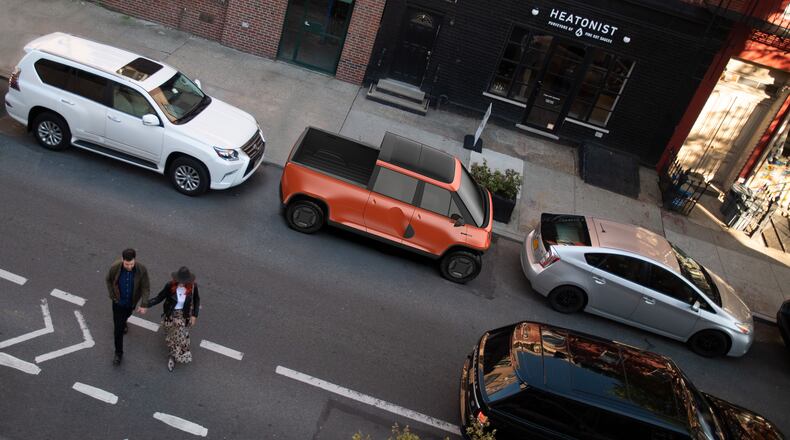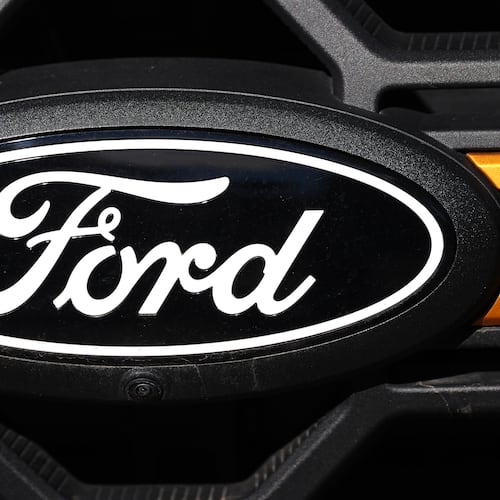The world’s most efficient pickup truck is the size of a Mini Cooper, and it runs on pure electricity — but is it the kind of truck that American buyers will like or, even more important, buy?
At the outset, it is not a clear yes-or-no answer. Ride along as we investigate the tiny Telo mini truck as it attempts to disrupt not just the pickup truck scene but the entire electric vehicle market.
What is the Telo mini truck?
According to the manufacturer, the Telo mini truck, named the Telo MT1, is an “urban adventure vehicle.” That designation translates into a subcompact form factor with the wheelbase of a Mini Cooper and the payload and towing capacity of a Toyota Tacoma.
The 5-foot bed even has a forward divider that folds to allow 4x8-foot sheets of plywood or other long items to fit entirely within the MT1’s boundaries. For other awkward items, an under-bed storage area passes through the MT1 side to side. The bed has a locking tonneau cover to secure valuables.
Credit: SPECIAL
Credit: SPECIAL
Digging into the specs, the MT1 is 152 inches long, 73 inches wide and 66 inches high. For perspective, a 2025 Mini Cooper 2 Door is 152.6 inches long by 68.7 inches wide and 56.4 inches high, while a 2025 Toyota Tacoma SR5 6-ft bed XtraCab is 213 inches long by 76.9 inches wide and 73.9 inches high.
Despite the MT1’s small footprint, however, the EV is powerful, with a standard 300 horsepower motor and up to 500 hp available, a 260-350-mile range and zero-to-60-mph acceleration as low as a claimed 3.5 seconds. A 106-kWh battery provides the electrons and can be recharged from 20% to 80% in 30 minutes at a DC fast charging station. Seating configurations include two-seat, five-seat and eight-seat layouts.
Credit: TELO Trucks
Credit: TELO Trucks
The tiny Telo truck can carry a payload of up to 2,000 pounds (1,700 pounds with dual-motor AWD) and can tow up to 6,600 pounds. Perhaps best of all, the MT1’s power train and systems include many off-the-shelf parts rather than special proprietary equipment, meaning technicians can replace the electric motors and other major components with relatively inexpensive commodity parts rather than expensive dealer-only parts.
Who is the Telo mini truck for?
Telo aims the MT1 at urban buyers who need the utility of a pickup truck but in a much smaller, more efficient package. With its multiseat configurations, the MT1 might also be a smart choice for families with young children. Telo sees the MT1 as the perfect urban utility runabout for regular retail customers. Still, it also sees a future for the MT1 in the work vehicle market, especially in urban areas.
Telo claims a fleet operating cost savings of about $800 per year per vehicle compared to an F-150 Lightning (an electric pickup truck) or more than $3,000 annually compared to a gasoline-powered F-150 — a substantial savings, especially once you multiply it by several dozen or several hundred vehicles across an entire fleet.
Will the Telo mini truck be a hit with buyers?
Whether the Telo MT1 will be a hit with buyers is a much more complex question. First, you have the issue of the sheer difficulty in launching a new automotive brand and all the attendant startup costs. Tesla, the most successful all-electric vehicle brand, has only managed about five years of profitable quarterly sales over the past 15 years of business, and much of that profitability is because of subsidies and incentives that are now under threat of repeal. Whether Telo has the runway necessary to weather the startup phase remains to be seen.
Next is whether EVs are on the upswing in the current economic and political environment. Tesla’s sales peaked in 2023, and the company reported a 71% decline in net income in the fourth quarter of 2024 compared to the same period in 2023. With overall economic headwinds and uncertainty about EV buyer incentives, demand is unlikely to be on the upswing.
There is also the question of whether the Telo MT1 will likely be a popular vehicle on its own merits. The market will have to answer that question. From my perspective as an experienced automotive journalist, the MT1 has upsides and downsides.
The MT1’s extremely compact footprint is a boon to daily life in a city with tight or limited parking spaces, congestion fees, alternate-day parking rules or all the above. On the other hand, Americans are frequently large, and the MT1’s small interior might not have the space and comfort Americans desire. Add to that the cabin’s Spartan design and the EV’s starting price of $41,520 (before any federal or state incentives), the MT1’s fabric-only interior might not meet some buyers’ idea of an appropriately luxurious or rugged truck.
Safety is a concern for buyers and a challenge for a startup like Telo to address at the same level as an established manufacturer. The MT1 makes some effort to be up-to-date on its safety tech, with collision avoidance and mitigation features, standard air bags and a structure designed for safety, but it’s that last factor that might make things challenging for the MT1.
To achieve such a compact footprint, the driver and front passenger sit at the very front of the vehicle, with only about 14 inches of crash structure between the nose of the MT1 and the cabin. Telo’s success partly depends on how well the structure fares in the National Highway Traffic Safety Administration or Insurance Institute for Highway Safety crash testing. The now-defunct Smart Fortwo, one of the only recent vehicles to feature a similarly small frontal overhang, scored four stars out of a possible five in NHTSA testing. Real-world safety might be an additional consideration with up to 2,000 pounds of payload in the bed adding to the energy of a collision.
What’s next for the Telo mini truck?
Having just made its debut to much of the automotive world in March in the form of early ride-and-drives, the Telo MT1 is gearing up to take the electric pickup truck and compact pickup truck markets by storm.
So far, this blunt yet burly little truck has an unquestionable interest and buzz. To turn that buzz into a roar of disruption, the MT1 must perform in the real world for real buyers. Fortunately, we should get the answer to that question and many others soon. Interested buyers can reserve the Telo MT1 now, with the first deliveries are expected in 2026.
Nelson Ireson is an automotive writer with Kelley Blue Book and Autotrader focused on cutting through the noise to deliver helpful, actionable information to today’s car buyers.
The Steering Column is a weekly consumer auto column from Cox Automotive. Cox Automotive and The Atlanta Journal-Constitution are owned by parent company, Atlanta-based Cox Enterprises.
About the Author
Keep Reading
The Latest
Featured





